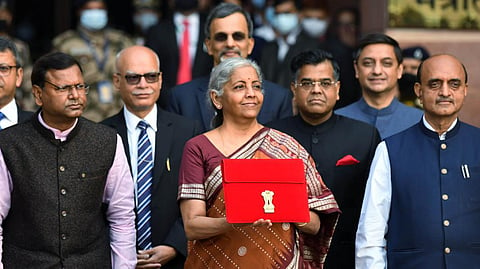

The Union government’s vote on account for 2024 will focus more on capital expenditure and less on populist gestures, feel most analysts, while there are also some who expect the event to make some concessions towards the impending elections.
The vote-on-account is designed to help the government meet its expenses until a new government is formed in May. Most analysts, therefore, do not see any grand policy announcements, particularly as the finance minister herself clarified the matter a few days ago.
“The 1st Feb budget is just a vote on account, a budget to meet expenditure till the next government comes to power. No spectacular announcements, you will have to wait till after the general elections," FM Nirmala Sitharaman said on December 7, at the CII's Global Economic Policy Forum 2023 in New Delhi.
This, however, has not prevented analysts from coming up with their projections for the upcoming event.
Analysts at the Centrum Broking Limited feel the major push of the interim budget will be towards capex spending.
“The budget will put its emphasis on spending for development while also providing a foundation for advancing the industrial and infrastructure sectors,” the analysts said.
The major thrust will remain on sectors such as roads, railways and urban infrastructure, they said.
Meanwhile, their compatriots at broking firm Sharekhan feel the vote on account will focus on three crucial elements- “capital expenditure, the ‘Make in India’ initiative, and a green energy push.”
The broker expects the government’s capital expenditure to slow down as compared to the previous years while it would on the contrary go ahead and incentivise private capex.
“We expect government spending on infrastructure to grow at a slower pace at high single to low double digit compared to an over 30% CAGR witnessed over trailing four years. In contrast, we believe the government would incentivise private capital spend (especially towards manufacturing and housing industries), which has remained modest over the past years due to global uncertainties and lower consumer spending,” analysts said.
Despite the impending election, analysts do not see any boost for welfare schemes and other populist gestures this time.
“With the recent triumph in state elections, the upcoming Interim Budget for 2024 appears [poised] to steer clear of grand populist gestures. Instead, the focus would be on maintaining the status quo with a keen eye on policy continuity,” said analysts at Sharekhan.
However, this does not mean that the government will completely ignore the stress that has been building up in the rural economy for the last two years. Sales of consumer goods, particularly two-wheelers and lower-end cars as well as discretionary items, have been under pressure in the rural markets.
Sharekhan, therefore, expects “enticing incentives” for reviving the rural economy and anticipates moves designed with the rural heartland in mind.
“The government has already provided some relief by extending the Pradhan Mantri Garib Kalyan Anna Yojna (PMGKAY) for an additional five years until December 2028. It might also increase the allocation under various rural schemes including MNREGA (was Rs. 60,000 crore in Union Budget 2023) and various skill development schemes such as Pradhan Mantri Kaushal Vikas Yojna 2.0 (budgetary outlay was Rs. 12,000 crore),” analysts said.
Contrary to what the Finance Minister has said about the budget being only about expenditure, some of the analysts have predicted an interim relief in tax cuts as an attempt towards improving consumption.
Meanwhile, Jefferies has a different take on the vote-on-account, and said it would be significant and would set the broad direction for the main budget that will follow towards the middle of the year. It pointed out that the February 2019 interim budget set the agenda for the ‘real’ budget that followed in July.
Unlike most others, Jefferies expects a relatively tepid growth in capex at around 7-8% and more focus on welfare schemes. However, the broker believes the slower capex growth by the government will be offset by the private and housing sectors.
At the same time the broker expects a boost in welfare spending, an increase of 7-8% excluding subsidies.
“By increasing social expenditure but decreasing capex growth, the government will try to contain the fiscal deficit at 4.5 percent of the GDP by FY26,” the broker said.
ALSO WATCH: